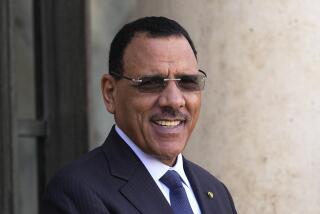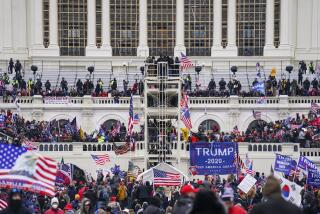As Morsi trial nears in Egypt, Muslim Brotherhood’s roots hold tight
CAIRO — As the Muslim call to prayer rang out from minarets across Egypt’s capital, the bearded men entering a nondescript building on a dusty back street were preparing to engage not only in an act of worship, but an act of defiance.
Hole-in-the-wall community prayer rooms like this one, known as zawiyas, are outlawed now, presided over by clerics who have no state sanction to preach. But still the worshipers come — many of them followers of the Muslim Brotherhood, which is itself banned.
Over the last four months, Egyptian authorities have made a sweeping and systematic drive to dismantle the once ascendant Brotherhood. Virtually all of its senior leaders are in jail. Thousands of its supporters are dead or imprisoned. Members of the Islamist group, and even their sympathizers, are vilified as terrorists. Assets have been targeted for seizure. Brotherhood-affiliated media outlets have been shuttered. Followers meet furtively.
And on Monday, the man who personified the high-water mark of the group’s power, deposed President Mohamed Morsi, is to be put on trial on charges of incitement to murder — a gesture explicitly aimed at evoking the Brotherhood’s humiliation and defeat little more than a year after Morsi became the first democratically elected leader of Egypt.
Yet the Middle East’s oldest Islamist movement, founded in 1928, has sunk deep roots through the decades despite being long repressed. And the current drive to eradicate the Brotherhood is proving a sapping endeavor for the country’s military-backed interim administration.
Few would contest that Egyptian authorities, at least for the time being, have the upper hand. A nationwide state of emergency, in effect for nearly three months, has given the government broad powers to move against anyone deemed a threat to security. State-run media are packed daily with anti-Brotherhood diatribes, and public opinion is overwhelmingly against the group. Army chief Gen. Abdel Fattah Sisi, who led the coup that brought Morsi down, has become a kind of Egyptian idol.
But much of the movement’s strength lies in small-scale activities that collectively loom large — social services like medical clinics and food kitchens that continue to aid the poorest of the poor; clandestine gatherings by members organized into small cells, or usra; and a persistent street presence that even large-scale police and military deployments have been unable to quash. The movement is nothing if not well schooled in operating underground.
Morsi’s year in office was disastrous. The Brotherhood, adept at marshaling opposition sentiment, seemed at a loss once it won power. The economy tanked, and the rigidly authoritarian Morsi alienated nearly all political factions, rebuffing attempts by important players to build alliances and strike compromises. The nationwide uprising against him that preceded the army coup was even bigger than the mass movement that forced out President Hosni Mubarak in 2011.
Now Morsi’s most vehement foes are having their day. Human rights groups and analysts say the scale and scope of punitive actions levied against the Brotherhood in recent months surpass even the tactics employed under Mubarak’s police state. The mid-August crackdown on Morsi’s followers who had set up sprawling protest camps in Cairo was described by Human Rights Watch as the largest unlawful mass killing in modern Egyptian history. Nearly 1,000 died.
Amid the daily roster of defeats, however, the movement has scored a few symbolic victories. While large-scale street demonstrations have foundered, pro-Morsi forces have managed to spark a significant student protest movement, including one at Al Azhar University, which is affiliated with Sunni Islam’s most venerable seat of learning.
Clerics licensed by Al Azhar have largely cooperated with the interim authorities in building calming rhetoric into their mosque sermons. Yet since the school year began, there has been a visible and vocal antigovernment current on the Al Azhar campus.
Groups of demonstrators gather almost daily to wave banners bearing the emblem of the pro-Morsi movement: a yellow, four-fingered hand that alludes to the name of the mosque complex where the August crackdown was centered.
Last week, pro-Morsi protesters overran the university’s administration building, smashing windows and breaking furniture. Riot police were called in to quell the disturbance — an extremely rare incursion by security forces into the complex.
Another influencing factor in the Brotherhood’s long-term prospects, analysts say, is the group’s web of financial and political connections outside Egypt, mainly in the Islamic world but also with offshoots in the West.
While shadowy, this network shares ideology as well as wealthy donors, prompting repeated investigations of the Brotherhood for alleged money laundering. These far-flung connections, analysts say, could help give the Brotherhood staying power in the face of the ongoing crackdown, and eventually push the government to strike at least some tacit deal with the organization, as has happened in previous administrations.
“The state of the Brotherhood’s international organization, and its network of local and international contacts, can really have an influence on decisions made here,” said Hazem Hosny, a political science professor at Cairo University. “The Brotherhood’s future in Egypt is dependent on this network and its influence.”
Among the Egyptian public, the Brotherhood’s image has been hammered by the government’s near-constant assertions that the entire movement, with its many branches, works hand in hand with armed Islamist groups. The Brotherhood professes nonviolence, but with the army battling a growing Islamist insurgency in the Sinai Peninsula, and attacks on security forces creeping upward elsewhere in the country, political Islam is now essentially equated with terrorism in the eyes of many Egyptians.
Pro-Morsi forces are also blamed for a surge in violence against religious minorities, including Coptic Christians and Shiite Muslims. An attack nearly two weeks ago outside a Coptic church on Cairo’s outskirts left five dead, including an 8-year-old girl, and about two dozen injured. The Brotherhood denied involvement, but pro-Morsi forces were implicated in a spree of church burnings in the late summer.
In the course of the crackdown, the government has largely ignored criticism from human rights groups, which have documented what they describe as a consistent pattern of abuse, including arbitrary arrests, lengthy detentions without charges, lack of access to legal representation and often-squalid jail conditions. (Somewhat ironically, many of the same complaints were leveled against the Morsi government.)
Since the July 3 coup, Morsi has had almost no communication with the outside world, and the military has not disclosed where he is being held. Relatives and backers say he still considers himself the country’s rightfully elected president.
His followers say the charges against him are a sham. Interim authorities say the trial will be fair, but have declared that whatever its outcome, there is no possibility of Morsi’s reinstatement.
“It’s irreversible,” Foreign Ministry spokesman Badr Abdelatty said of Morsi’s ouster. “That train has left the station.”
There are some signs of official concern, however, that harsh tactics could at some point generate a backlash. The sight of Morsi in the defendants’ dock — which in Egypt is an actual cage — might stir sympathy, as it did for Mubarak when he was put on trial. By Saturday, it was still not clear whether Morsi would appear in person in court, what the venue would be, nor whether photographs and video would be allowed.
Because the Brotherhood is a network of groups, rather than a monolithic entity, some of its charitable affiliates have been shut down, but others have been able to continue operating more or less normally simply by refusing to publicly acknowledge their Brotherhood links. Winning popular backing by providing much-needed services such as food handouts and schooling has long been a bulwark of Islamist groups like the Brotherhood, and those it assists tend to repay this sustenance with loyalty.
In some ways, being out of power has actually bolstered Morsi’s image, because he is no longer at the helm of a government whose bureaucracy is widely regarded as deeply corrupt and inept at providing even basic services.
On Friday, a heavy police and army presence near sensitive sites kept pro-Morsi demonstrations relatively small and scattered. But those who did turn out made a rallying cry of the impending court proceedings.
“Even using the word ‘trial’ is wrong,” said protester Mohammad Meleha. “What is he being tried for? ... We will not leave the street, not even for a minute, until this injustice ends.”
Special correspondent Ingy Hassieb contributed to this report.
More to Read
Sign up for Essential California
The most important California stories and recommendations in your inbox every morning.
You may occasionally receive promotional content from the Los Angeles Times.










